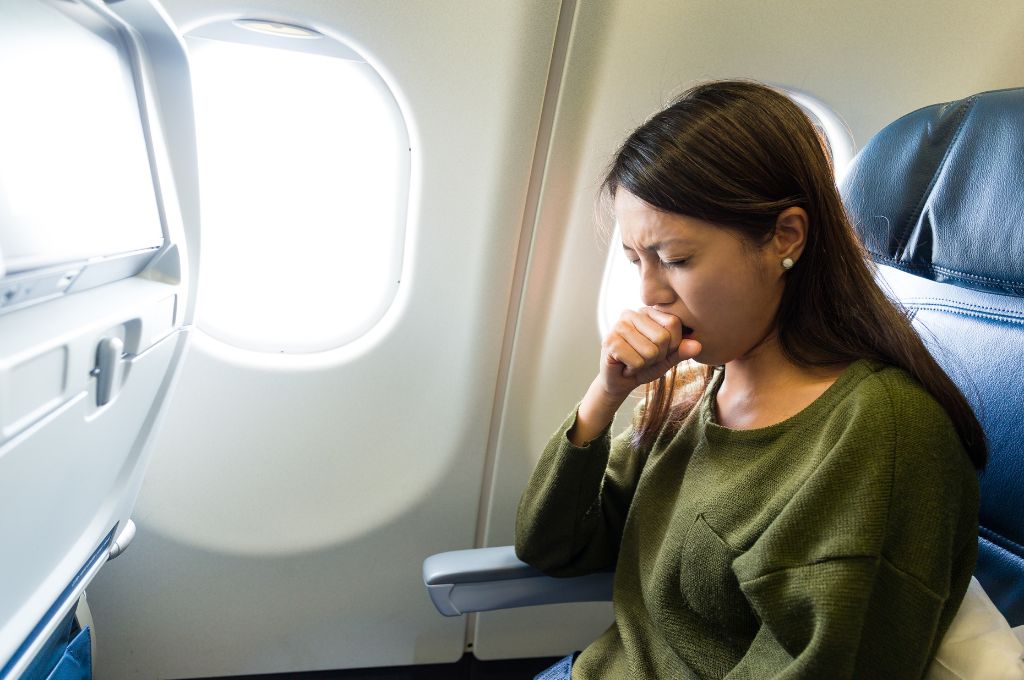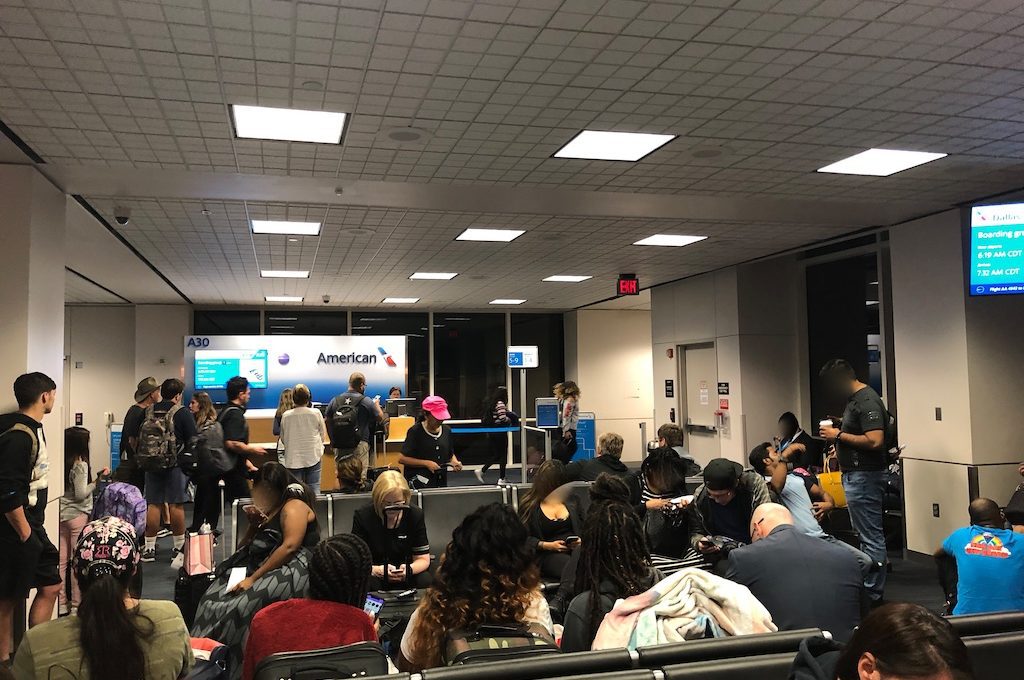Every year, adults have an average of 2 to 3 colds, and as many parents are aware, children have even more than that.
During the winter and spring months, if you do any flying it’s not uncommon to see other passengers who are obviously dealing with some type of cold or virus.
But what should the protocol be whenever you have a common cold and you need to board a flight? Are you allowed to fly and what steps should you take if you choose to fly?
In this article, we will break down what the law says and also give you some tips for dealing with this type of situation.
Can you still fly if you have a common cold?
If you are dealing with the common cold you can still fly on a plane. However, there are some key things you want to consider before jumping on a flight, including getting familiar with what the law says.
Keep reading below for more insight on this question!
And note: You should always consult a medical doctor before making any decisions that could impact your health. This article does not contain medical advice.

The rule of thumb
Typically, airlines will only deny boarding if they believe the passenger has a contagious disease or other condition that could create a health or safety threat while on the flight.
The interesting thing about the common cold is that it is actually excluded in the wording of the relevant laws regarding conditions that could lead to being denied boarding.
Let’s take a look at the law to clarify.
What the law says about flying with a common cold
As mentioned, an airline may deny you boarding if they determine that you are a “direct threat.” In other words, if you looked like you had a seriously contagious disease an airline could deny you boarding.
Airlines are instructed to determine a direct threat by considering “the significance of the consequences of a communicable disease and the degree to which it can be readily transmitted by casual contact in an aircraft cabin environment.”
So they are basically looking at how serious the condition is and how easily can it be spread to others.
How serious should an airline consider the common cold to be?
Well, we have specific guidance on this because the first example mentioned in the statute states:
The common cold is readily transmissible in an aircraft cabin environment but does not have severe health consequences. Someone with a cold would not pose a direct threat.
So right there you have the support you need (from a federal law) that is telling you that you can fly with a common cold.
However….
This does not mean that you should always fly when you have a common cold and there are a few reasons why.
You may not know what you have
First, unless you have visited a physician and been examined and or tested, you may just think that you have a common cold when in reality you have something that is more of a problem such as the flu.
Many of the common cold symptoms overlap with symptoms of other more contagious conditions.
These symptoms include:
- Runny nose
- Congestion
- Sneezing
- Weakened senses of taste and smell
- Scratchy throat
- Cough
According to medical experts, it’s rare to have a fever when you have a cold, so that’s something to keep in mind when trying to decide if you should fly or pay a visit to the doctor.
Related: Can You Still Fly if You Have a Cough? (Or Should You?)
You could get worse
Even if you only have a cold, if the cold is just emerging there is a chance that it could get a lot worse during the flight. Flights have a tendency to exacerbate symptoms when you feel ill.
Being stuck in a metal tube for hours can be a nightmare if you’re dealing with symptoms like nausea or just the general unpleasant feeling of being sick.
If your symptoms happen to peak while you are on a flight, you could appear so sick that flight attendants and the crew could choose to divert the plane which could be a huge inconvenience to all of the other passengers.
So my number one tip for traveling when sick is to first know what you are dealing with before you head to the airport.
Getting others sick
Colds are highly contagious and can be spread through the air. While an aircraft cabin is actually a pretty safe place to be because of the filtration systems in place, there still is always that possibility that you could spread your cold to others.
Lots of airlines will allow you to change your travel dates without a change fee so if it is practical for you to change your dates then consider pushing your trip out a few days so that you can get better.
Deciding on if you should travel: what it comes down to
When deciding on whether or not you should travel with a common cold it comes down to the necessity of your travel and the precautions you are going to take.
For example, if you have a cold but you really need to travel and you are willing to distance yourself from others, wear a mask, etc., lots of people will not have a problem with that.
Some situations where travel may be necessary would include situations like:
- Traveling to spend time with family when you can’t change your dates
- Attending a funeral
- Traveling for medical treatment
- An important work event
If you are just traveling for leisure or a vacation that is a bit more controversial.
On the one hand, it’s understandable that you would want to travel because you may have booked a trip that is not changeable and you could be losing out on a lot of money. While you may have a cold at the moment, you could get better in a few days and still be able to enjoy a large portion of your vacation.
On the other hand, people have a tough time accepting that you are going to put others’ health at risk so that you can enjoy a vacation. If you failed to get travel insurance to cover an illness, then that is on you they would argue.
It’s a pretty heated debate but you can take some of the heat out of that debate if you are willing to take some precautions.
So let’s take a look at some of the precautions you could take to help diffuse some of the tensions.
The first is wearing a mask.
People are very polarized on masks when it comes to mandates and requirements but most people agree that they will wear a mask whenever they are sick.
Passengers will be much more understanding of you traveling sick if you are covering up your coughs and sneezes with a mask.
(Just an FYI, based on the language of the statute, I don’t think an airline could force you to wear a mask if you had a cold since it does not qualify as a “direct threat”.)
Keeping your distance.
When you are exhibiting symptoms of a common cold try to keep your distance from others.
Avoid standing or hovering close to people during boarding or when spending time in security or an airport lounge. There is nothing worse than getting “hit” by someone’s cough.
Something else that you can do if you have the extra money or the miles is purchase an additional seat.
I recently did this when Brad and I booked a flight in economy while I had a bad cough. I used United miles to purchase an extra seat so that Brad and I could occupy the entire three-seat row and not have to be close to someone else.
Ultimately, if you choose to fly with a cold, other people may not like that you are sniffling and coughing but expecting people to never never travel when they have something like a cold is just not realistic.
Try not to escalate any situation but if you are taking all the precautions you can, don’t let others shame you into feeling bad just because you chose to travel.
What to do if questioned by airport staff
If you are hanging around the boarding area and are approached by a crewmember and asked about your illness, you can always explain to the agent that you are dealing with a common cold.
If you have the law/link above printed out or saved to your phone, you could always have that on standby in case you need to show the agent that a common cold does not present a direct threat.
The thing is, the airline would have to take your word for it that you only have a common cold. You have to remember that from their perspective, anybody could just claim that they “just have a common cold” when in reality they have something much more serious.
For that reason, the airline may want to consult with one of their medical service providers to further evaluate if you are fit to fly.
If you are able to visit the doctor before your trip and get a doctor’s note that states that all you have is a common cold, you will probably have a very high rate of success of getting on the plane.

Final word
Flying with a common cold can be done but that does not mean you should always do it. If you can, try to reschedule your flight but if that’s not an option then take some precautions that will make other passengers more understanding towards your condition.
Daniel Gillaspia is the Founder of UponArriving.com and the credit card app, WalletFlo. He is a former attorney turned travel expert covering destinations along with TSA, airline, and hotel policies. Since 2014, his content has been featured in publications such as National Geographic, Smithsonian Magazine, and CNBC. Read my bio.

